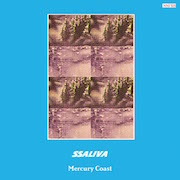One could argue that Francois Boulanger’s Ssaliva is a project for which the only constant is change, but his stock in trade has generally hemmed close to his woozy, watery brand of house music. Previously unknown to most, though, are a series of 2010 recordings wherein Boulanger broke away from that zone entirely, holing up in his hometown of Chaudfontaine to dump almost two dozen lonely, smoke-stained dream doodles onto his precariously functioning cassette 4-track. The results, belatedly issued by LA’s Not Not Fun as Mercury Coast, are somewhat out of step with the rest of Boulanger’s catalog, but they make perfect sense in the context of that label’s signature huzz and flutter. Guitar is the primary vector here, and the album moves through downer surf, blown post-punk jangle, and gnarled bedroom Thurston-isms with a loner grace that belies its origins as a side effort. It’s dusted with some strange magick.
Mind you, there’s nothing too shockingly new or left of center here. The warbly fidelity pleasantly mutes and makes intimate what might otherwise sound like water-damaged Durutti Column outtakes or demos for an epic post-rock record, sure, but even that’s been done. The album’s eerie familiarity, though, is actually part of its strength, calling to mind the secret tapes of a half-friend from college who hid their guitar under their twin bed lest they have to answer questions or – horror of horrors – play it in front of anyone. If you’ve known someone like that, you know the story: only two years later do you find out, usually through a friend, that all the time you presumed that loner weirdo was spending torrenting wank material was actually spent hunkering with a mic propped on a pile of dirty towels, recording damaged and lonely jams for nobody.
When you finally happen to hear these recordings, the melodies and structures are easy to digest, but the music is lent emotional heft via a certain emotional claustrophobia that has seeped into the fabric of its sound. Kind of like the ganja smoke Scratch Perry apocryphally blew on all of his Black Ark masters to give it a "final touch", except with vague anxiety and depression in place of psychotropic warmth.
I wouldn’t deign to guess how much this perception actually reflects Boulanger’s state of mind during the recording of Mercury Coast, but it’s a helluva vibe to imbue on something. Whether it’s willfully invoking that (non?)aesthetic or is simply of like mind is more or less immaterial.
Mercury Coast is somewhat of a piece with the "hypnagogic" moves sub-popular around the time of its initial recording – think early Ducktails, City Center, and a good chunk of the Night People and Not Not Fun catalogs circa 2010 – but somehow, it seems to sit outside of all that. For all its bedroom-oriented aesthetic markers, most of that stuff is ultimately amiable, as if it was made as "music for use" (ie. making out, washing dishes, closing your eyes at gigs) for any number of hip friends. While I’m sure Boulanger gets along just fine socially in real life, and you could just as reasonably use this music to the same ends as any of the aforementioned, Mercury Coast nonetheless sounds like it doesn’t have a friend in the world, and is peculiarly stronger for the fact.


